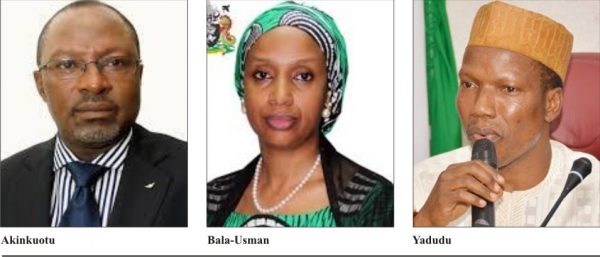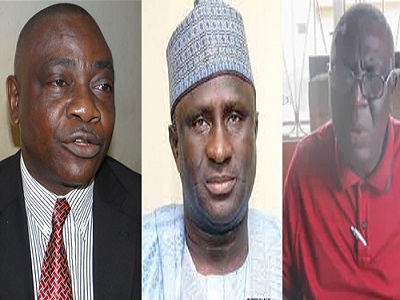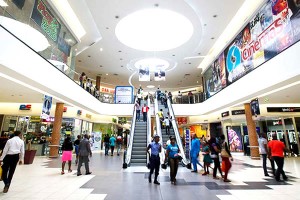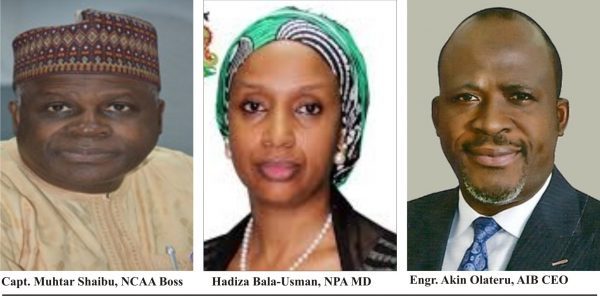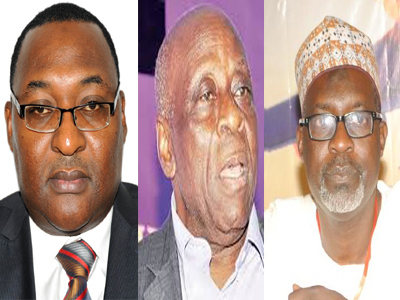Q1 Transport Sector Rating: How NIMASA, NPA, Customs, Others Fared
By Kenneth Jukpor & Oyeniyi Iwakun
There was deluge of optimism with regards to the expected developments across several aspects of the nation’s transport sector when the year 2018 began, but the first quarter has ended. How have agencies in the Nigerian transportation sector fared so far. MMS Plusbrings you an assessment of the major parastatals in the transport sector based on their core functions.
For the grading system: A =90-100%, B+ = 80-89%, B =70-79%, C+ =60-69%, C =50-59%, D =40-49% and E = 30-39%, F = 0-30%. Enjoy it:
Nigerian Maritime Administration and Safety Agency (NIMASA)
NIMASA is the agency saddled with the onus of maritime administration and safety; to pursue the development of shipping and regulatory matters relating to merchant shipping and seafaring.
The Director General of the agency, Dr. Dakuku Peterside set the pace in February with the launch of ‘2018 Nigerian Maritime Forecast’ to provide a guide to investment in the sector for 2018 and 2019; but how did NIMASA fare in the first three months? To ascertain this, we look at NIMASA’s core functions unbundled into ten (10) parts each carries 10 points:
Administration and regulation of shipping licences: NIMASA inaugurated a Maritime Committee on Nigerian Ship Register during the launch of the ‘2018 Nigerian Maritime Forecast’. The committee is saddled with the responsibility of ensuring that a review is done in ship registration process to ensure that it becomes more attractive to businesses, projects Nigeria’s image positively and ensure that it contributes positively to the nation’s economy. The committee headed by Engr. Emmanuel Ilori, is yet to conclude its findings. Score = 5/10
Administration, Regulation and Certification of Seafarers: This is a complicated issue. Lack of Nigerian owned/ flagged vessels means no opportunities for seafarers to obtain the requisite seatime and become employable seafarers. Therefore, the agency had little to do in this regard. NIMASA has begun to send cadets all around the world for seatime and its performance of this function is expected to improve in later in 2018, if the Maritime Development Bank bill is passed and the institution established to provide the much needed shipping funds. Score = 2/10
Establishment of Maritime Training and Safety Standards/ Regulation of safety of shipping as regards the construction of ships and navigation: The truth is there are no competent officers to play this role so it has not been attended to in the first quarter of 2018. Score = 0/10
Maritime Search and Rescue Services and Providing direction to ensure compliance with vessels security measures: Search and rescue operations in the country is yet to improve; while the equipments acquired for billions of naira are abandoned at the NIMASA Research Institute, visit Kirikiri. However, on the provision of direction to ensure security measures NIMASA has slightly improved. Score = 3/10
Provide Maritime Security:
NIMASA and Navy but in a lot in 2017 to guarantee modest improvement but the 2018 first quarter report show retrogression. An aggrieved victim spoke to MMS Plus on this issue: “Early last month (February), there was another piracy attack at the eastern ports with about four crew members abducted. We still don’t know their fate but there is an organization that is supposed to take responsibility (NIMASA). We were not having this frequent piracy attacks during the last regime of leadership in the Nigerian Maritime Administration and Safety Agency (NIMASA). I am not talking politics here but the reality at the eastern ports. The infrastructure that the last regime in NIMASA put in place with private organizations is still there but they are not being deployed to save lives and property in the eastern ports. And then the new infrastructure being promised by the current Director General of NIMASA is not operational” Score = 2/10
Enhance and administer the provision of Cabotage Act 2003/ Control and prevent Maritime Pollution:
NIMASA has nothing in the first to change the status-quo. Nothing significant was recorded in the area of maritime pollution. Score = 3/10
Develop and implement policies and programs, which will facilitate the growth of local capacity in ownership, manning and construction of ships and other maritime infrastructure: Indigenous operators continue to clamour for better opportunities via local capacity ownership, manning, construction, among others, nevertheless, no programme has been organized and no policy was organized to address this function so far in 2018. Score = 0/10
Perform Port and Flag State duties:
This function was characterized by poor service delivery throughout 2017. Let’s hope for a change this year. Score = 4/10
IMO Conventions:
NIMASA reached a level where they received IMO commendations for following its conventions especially in compliance to ISPS code but the agency is yet to soar on the massive maritime advantages and cargo traffic in the nation. Score = 7/10.
Carry out Air and Coastal Surveillance: NIMASA performed well here but it was probably as a result of the collaboration between the agency, the Nigerian Navy and the Nigerian Airforce.Score = 5/10
Conclusion:
With the slow pace of the nation’s budget approval, NIMASA can argue that the required funds aren’t available to tackle some core functions; however, there are several areas that remain untouched. NIMASA is saddled with a huge responsibility with unique challenges; but there is this apt saying; “It’s not the load that breaks you down; it’s the way you carry it”
Grade F (27%)
Nigerian Ports Authority (NPA)
For the purpose of this study, the functions of NPA, also known as the landlord of Nigerian ports, were grouped in five major areas, with each carrying 20points:
• Ownership and administration of land and water within port limits/ Planning and development of port operational infrastructure
The roads leading to the nation’s foremost ports in Lagos are undergoing reconstruction; however, there are no lighting systems. It was expected that the Executive Order which called for 24hours port operations would lead the Authority improve the port infrastructure especially in the provision of lighting systems to enable work at night. Score = 15/20
• Leasing and concession of port infrastructure and setting bench mark for tariff structure
In 2107, the Authority showed little concern about the work environs and challenges facing port terminal operators; continuously reneging on promises made to concessionaires in aspects of dredging while it collects duties. However, 2018 has been different with the Authority suspending some terminal operators over lack of holding bay in February.
Although, the NPA Managing Director recently promised to support the completion of all deep seaports projects across the country by ensuring efficient channel management, existing port operators in Calabar have a different story to tell after such promises.
The NPA boss was speaking when management of the Infrastructure Concession Regulatory Commission (ICRC). One can expect a better synergy between both organizations to guarantee and improvement in concession of port infrastructure. Score = 12/20
• Day to day monitoring of operations and enforcement of relevant sections of respective agreements.
Under the leadership of Ms. Hadiza Bala-Usman as the Managing Director, the Authority displayed resilience in monitoring and enforcing relevant national policies like the monetary payment into the Treasury Single Account (TSA). She has continued to guide the Authority in the right path so far this year. Score = 13/20
• Responsible for Nautical/Harbour operations and Hydrographic survey/ Marine incidents and pollution
Since NPA launched four new tugboats as well as new cafeteria and health facilities at the Lagos Port Complex; little has been done to curb pollution and no statistics on marine incidents has been issued in 2018. Score = 6/20
• Maintenance of safety and security at the common user areas/ Enacting port regulations and bye-laws as well as monitor and enforce them
In the area of safety and security, NPA Security personnel became famous with their corrupt collaboration with the Nigeria Police for extorting truckers and other port users at the port gates in 2017.
In the first quarter of 2018, stakeholders continue to allege extortion by the Authority’s officers at port gates and MMS Plus is keeping a watching eye in a bid to get hard proof to nail some culprits. Score = 5/20
Conclusion:
The Authority almost reached the 50% pass mark in the first quarter of 2018. There is room for improvement in several areas, although the doggedness of the NPA boss must be commended.
Grade = D (51%)
Nigeria Customs Service (NCS)
The Nigeria Customs Service (NCS) is a major revenue base of the government and one of the most prioritized government institutions. The performance of NCS can be done based on four (4) of its statutory functions.
• Anti-Smuggling Activities:
The anti-smuggling operations translate into prevention and suppression of smuggling, Customs seems to have done creditably in this aspect even if there are reservations on the end points of the seizures and other intercepted goods. There has been increase in seizures and arrests of smugglers. The anti-smuggling units have engaged smugglers fiercely with the aim of suppressing it to the barest minimum but their operational modalities have also resulted into the death of some innocent citizens who became victims of the gun duel between customs and smugglers.
Most Customs Commands have adopted a media-Customs partnership model with journalists where seizures and other activities are brought to the notice of the masses on regular basis.
However, despite the praises for the massive interception of contrabands, false declaration and under-declaration, it has been discovered that Customs officers at the ports and border stations aid these sharp practices and in turn alert their colleagues at FOU to intercept the same consignments.
Again, the absence of functional scanners still remain a major challenge in the fight against smuggling and there is need for aggressive sensitization programmes, campaigns and seminars to increase awareness on benefits of legitimate trade and the dangers associated with smuggling because there is an obvious disconnect between NCS and residents of communities at the border stations and unapproved routes who would have been of great help to Customs in the battle against smuggling. Score = 11/25
• Collection of Revenue (Import /Excise Duties & other Taxes /Levies) and Accounting for Same:
At the end of the first quarter of 2018, the two largest Customs Commands, Apapa and Tin-Can Island have experienced impressive improvement in their revenue generation. The Apapa command has generated the total sum of N81, 748, 437, 192.00. This when compared to the N77, 439, 645, 715. 00 collected as revenue in the same period in 2017 shows an increase in the revenue profile by N4, 307, 791, 477. 00. While the Tin-Can Island command recorded N76,789,721,107.34 well above the N61,839,825,487.91 raked-in in the same period in 2017, signifying a positive difference of N14,949,895,619.43. It means the Col. Hameed Ali (Rtd.) led Customs is working assiduously to meet its revenue target for the year 2018.
The Customs management took some strategic measures to ensure seamlessness in revenue collection with blockage of revenue leakages. The various commands have begun training on the deployment of the Nigerian Customs Integrated System (NICIS II) and it is expected that with its roll out coupled with the repair of Apapa road the NCS will build on her revenue profile in the months ahead.
Nonetheless, NCS may be applauded considering the prevailing circumstances surrounding the nation’s trade system, especially, with regards to Nigeria’s current trade policies targeted at growing the local economy, which when considered, could change the opinions. Score = 10/25
• Trade Facilitation/ Engaging in Research, Planning and Enforcement of Fiscal Policies of Government:
Trade Facilitation by Customs experienced major setback between January and March, 2018. The mode of operations still remained business as usual except the recent move to deploy NICIS II. No tangible landmark improvement has been noted in this respect. The service introduced the Authorized Economy Operator (AEO) programme for effective trade facilitation in 2017 but remained a mere paper presentation ever since then.
Customs still finds it difficult to implement the Executive Order on 24hrs operations at the ports and other policies on ease of doing business. Freight Forwarders, Clearing Agents, and Importers still operate at a tight condition and the acclaimed revenue success seem to be achieved at their detriment as the nation’s currency and exchange rate coupled with prevailing policy environment which formed as major determinant is still dwindling.
Not much is heard about Customs plausible role in Research and Planning. The Federal Government’s ban on land importation of some goods, relatively high tariffs and other exorbitant charges coupled with forex shortage still contribute to the hardship. Despite overrated publicity on benefits of locally produced rice, Nigerians still feed largely on foreign parboiled rice while the locally produced is still in scarcity, hence, the increase in rice smuggling activities. Score= 5/25
• Working In Collaboration With Other Government Agencies In All Approved Ports and Border Stations:
One important statutory function of Customs is to work in collaboration with other government agencies in all approved ports and border stations. Notable achievements are seen in this aspect as Customs successfully collaborated with sister agencies including Nigeria Police Force (NPF), Standards Organization of Nigeria (SON), Nigeria Drug Law Enforcement Agency (NDLEA), National Agency for Food and Drug Administration and Control (NAFDAC), Economic and Financial Crimes Commission EFCC, the Nigerian Army in ensuring compliance, anti-smuggling and other forms of crime combats which includes illegal commercial activities and illicit trade acts; for instance, import of fake and sub-standard goods; Infraction on Intellectual Property Rights; Illegal international trade in endangered species; Illegal trade in arms and ammunition; Money laundering; Traffic of illicit drugs; Illegal trade in cultural Artifacts; Importation of pornographic materials; Importation of toxic and hazardous substances. Several seizures were handed over to the relevant agencies for further investigation.
However, there were also some accusations against Customs on the modes of interception and investigation of intercepted arms that at a point the Police Commissioner at the Western Ports accused the Customs of sidelining the police in its investigations.
The anti smuggling success stories will not be complete without acknowledging the roles of the Navy, Police and Civil Defense Corps. Score=14/25
Conclusion:
With the performance in the first quarter of 2018 breaking the records of past revenue collections, it is expected that Customs improves tremendously on this and other core areas in the second quarter of the year.
The absences of functional scanners remain a major concern and Customs management must take note of the increasing smuggling activities and ensure that the syndicates and other customs officers guilty of various offences are openly prosecuted; this will serve as deterrence to others and rebuild trust and confidence in the service even though, its key global function as a trade facilitator has taken a back stage.
Meanwhile, the introduction of new uniforms is commendable as it would boost the image and look of the service and will enhance easy identification and placement of officers but the welfare of officers must also be prioritized.
Grade = E (40%)
Nigeria Railway Corporation (NRC)
As one of the critical government institutions that provide support in transport services in the country, the Nigeria Railway Corporation (NRC) had enjoyed more attention and support from the Federal Government since the year 2017. What has happened in the first quarter of 2018? NRC is assessed based on five of its statutory functions with twenty (20) marks for each.
Manage and operate the railway for carriage of passengers and goods:
This function is expected to be carried out in a manner that will offer full value for money. Between January and March 2018, the NRC management intensified efforts to ensuring improvement and efficiency in services to the freight owners and the teeming commuting public.
NRC recorded impressive successes in freight patronage and set back in service delivery on both freight and passengers trains in this quarter. Although, it impressively helped in the decongesting the Apapa axis in the face of the ongoing road construction that has caused serious gridlock with Lagos district commencing a shuttle service between Apapa and Alago meji since 2017 but there had been various reports on poor welfare to customers and low quality service delivery. For instance, it was reported around February by some aggrieved customers who took their wards, Pupils and Students of primary and secondary schools respectively on excursion at the Lagos District that the locomotives developed faults while the innocent children scattered all over the places were left stranded for hours. According to them, NRC neither refunded their money nor compensated them. On a similar note, the Chief Executive Officer (CEO), Best Foods, Mr. Emmanuel Ijewere, lamented a massive loss of several millions of Naira while trying to move some tomatoes from Kano to Lagos. He noted that the action was on two occasions where in the first, he said it was due to poor storage system in the trains which exposed the tomatoes to high temperature while on the other occasion, it was as a result of a derailment around Jebba.
People seem to still lack confidence in NRC in terms of quality service delivery hence the failure in NRC talks with Total and other major oil marketers on the effective use of the forty tank wagons that had been abandoned since its purchase in 2012.
Based on this NRC scores 6/20
Meet cost of operation; improve market share and quality of services;
NRC still finds it extremely difficult to generate enough revenue to meet its cost of operation as bulk of its finances come from the Federal Government who pays workers salaries and other related expenses. This is a major discouragement to the government having realized that more is expended with little or no income from the sector.
NRC tried to improve its quality of services early in the year with new trains and locomotives commissioned by the president, President Muhammadu Buhari at the Abuja-Kaduna station to meet up with demands at the stations. Although, there was increase in the ticket fare but when quizzed by MMS Plus, the Director, Operations, Mr. Niyi Alli justified the decision by arguing that the quality of services enjoyed by passengers at the station is commeasurable with the fare. The Abuja-Kaduna train was of qualitative services coupled with other customers’ service innovations.
Score = 4/20
Direct and control of any expansion or extension of the railway and the construction of new railway:
Several financial commitments, reforms and innovative policies are initiated towards its improvement in the first quarter of 2018 with more standard gauge railway tracks construction approved.
Although, not much was heard about federal government’s move to concession the narrow gauge to General Electric (GE), an American consortium but the Director, Operations, NRC, Niyi Alli told MMS Plus in a recent chat that the process was ongoing but had been slow owing to the need to do things correctly without rush.
Equally, FG approved Ibadan-Kaduna railway construction and there are efforts to complete the ongoing rehabilitation of the railway. There are also templates for technology transfer
Score = 6/20
Ensure safety of operations and maximum efficiency;
There were no major reports of train derailments but accidents involving individuals walking around the rail tracks were recorded with loss of lives. Reports of robbery, theft and other security breaches wasn’t heard.
Score = 11/20
Meet social responsibility in a manner that will meet the requirements of rail users, trade, commerce, industry and general public:
In terms of social responsibility, NRC cannot still meet the requirements of rail users, trade, commerce, and others. This has been blamed on capacity constraints and neglect by past governments and existing railway act which is preventing the input of private investors.
Delays and non-adherence to time schedules without explanations are still obvious qualities of Nigerian railway services.
It is incontrovertible that the DMU which is the standard coach and locomotive is still not affordable to the common man.
Nothing tangible was recorded in the areas of corporate social responsibilities.
There was improvement in the public relations skills at the NRC headquarters while the Lagos District poorly related with the public in the first quarter of the year. It is hoped that the district would improve in this area in the second quarter.
Score = 2/20
Conclusion
The additional Diesel Multiple Units (DMU) locomotives and other modern facilities newly commissioned at the Kaduna-Abuja station compliments government’s commitments to the railway revitalization project. Low capacity and poor customers’ relations remain a major challenge in NRC as it still cannot meet up with demands in both passengers and freight services.
The concession idea still appears utopian as no visible progress is seen despite promises by the federal government.
Nonetheless, the railway transport system is still popular because of consistency in activities in the sector. The Nigerian Railway, having completed its phases of rehabilitation of its vast assets, is still expected to play an increasingly pivotal role in the economic and social developments of the country in the second quarter of 2018.
Grade E (29%)
Expect more grading and analysis of other transport sector agencies like Nigerian Shippers’ Council (NSC), Federal Airports Authority of Nigeria (FAAN), National Inland Waterways Authority (NIWA), Nigerian Civil Aviation Authority (NCAA), Nigerian Airspace Management Agency (NAMA), Accidents Investigation Bureau (AIB), among others, next week.
Copyright MMS Plus.
All rights reserved. This material, and other digital content on this website, may not be reproduced, published, broadcast, rewritten or redistributed in whole or in part without prior express written permission from KINGS COMMUNICATIONS LIMITED.




